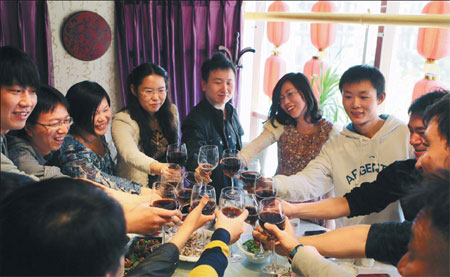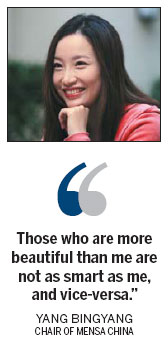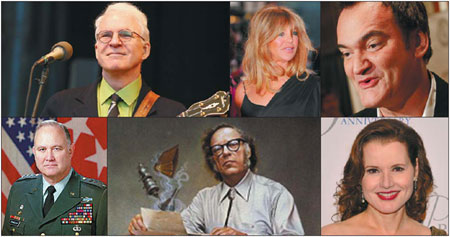Mensa's ideals are often put to the test, reports Shan Juan in Beijing.
Yang Bingyang is a busy woman. Her roles include Internet sensation, magazine columnist, author and television host. She also owns an online cosmetics shop. The 28-year-old Sichuan native is highly protective of her public image and seldom leaves home without applying makeup and often carries false eyelashes in case she's asked to pose for press photographers unexpectedly.
However, Yang has yet another role. Perhaps surprisingly in a country where brains and beauty are often regarded as being mutually exclusive, she is also chair of the Chinese branch of Mensa International, the society for people with high IQs.
 |
|
Members of Mensa China gather in Beijing. It emerged in late 2007 and was formally recognized as an emerging Mensa group in 2011. Zhu Xingxin / China Daily |
Founded in the United Kingdom in 1946, Mensa has around 110,000 members in more than 100 countries and regions and aims to provide a forum for intellectual exchange among its members.
Eligibility is restricted to those able to attain a score within the upper 2 percent of the general population on an approved intelligence test. Although the society doesn't disclose its criteria by region, the required IQ level for people on the Chinese mainland should be at least 135.
Chinese hopefuls began applying to Mensa International for membership in 2005 and Mensa China emerged in late 2007. The branch was formally recognized as an emerging Mensa group in 2011.

It usually takes at least 12 months to become a full national group, and factors - including membership numbers, media exposure, projects to keep members on board, and activities - are evaluated before new branches are granted full status.
In China, those who want to join must first apply online and later take an organized examination, usually held once a month. It costs 260 yuan ($41) to take the test. Applicants are only allowed to take the test twice and anyone who fails it on both occasions is immediately disbarred from taking it again. Successful applicants pay an annual membership fee of 265 yuan.
Membership applications are currently rising. Before 2011, when candidates could take the entry test in Beijing, Shanghai and Guangzhou, only around 50 people applied nationwide each month. However, since then the number has risen to 80 or more across all the testing centers.
Currently, the test can be taken in Beijing, Shanghai, Guangzhou, in Guangdong province, and Nanchang, in Jiangxi province.
At present, Mensa China remains at the fledging stage and runs no special programs, other than general meetings, according to Yang.
Worldwide, Mensa national groups are usually registered as NGOs in their respective countries, but in China the group remains unregistered because of difficulties in gaining NGO status.
People join for a variety of reasons. Some apply simply to see if they can pass the entry exam; others want to meet new friends, unearth business opportunities or simply show off.
High-profile members
Although the society has a number of world-famous members, such as actors Geena Davis, Goldie Hawn and comedian Steve Martin, Yang is undoubtedly the highest-profile Chinese member.
She became one of the first Chinese to join the society when she passed the exam in 2007, and the following year she was elected chair of Mensa China, which has nearly 250 members.
 |
|
Some famous Mensa members include (clockwise) Steve Martin, Goldie Hawn, Quentin Tarantino, Geena Davis, Isaac Asimov and Norman Schwarzkopf. Provided to China Daily |
She conceded that it is not an easy task to provide leadership to such smart people. "Each has his or her own strongly held opinions, so compromise is often not an option," she explained.
As chair, her role is to supervise and coordinate entry tests on the Chinese mainland, liaise with the media and Mensa's headquarters in the UK, send out membership cards and gifts, and organize meetings and activities.
Compared with the society's membership in other countries, Chinese members are likely to be much younger. They mainly come from the post-1980s generation, are well educated and most are unmarried.
They are smart, but ordinary people who tend to be more humorous, rational and logical than others, said Yang, who added that the occupations of Chinese members are widely diverse, ranging from lawyers to the self-employed.
Many members share common character traits, such as the ability to learn quickly, a tendency toward laziness and are easily bored, she said.
In many ways, Yang is representative of her members: Although she didn't study hard at school, she was always able to excel effortlessly in events such as International Physics Olympiads. After high school she was only able to gain entry to an average university in her hometown.
However, none of that hampered her later success, albeit success of an unconventional kind.
An online sensation
A trendy, attractive young mother decked out in a bright pink velor Juicy Couture hoodie and matching pants, Yang has already published two books offering advice about relationships. The books have been so successful that she has recently bought a BMW car, "the favorite among the nouveau riche in China," she joked.
As an online sensation, Yang now has more than 620,000 followers on the Sina Weibo micro blog, China's equivalent of Twitter, and she likes to post photos of herself, usually ones in which she is scantily clad. Many of her followers consult her about relationships and makeup.
Her personal motto, "Those who are more beautiful than me are not as smart as me, and vice-versa" has become popular with many of her online followers.
She dismissed criticism that she lacks modesty with: "I am just telling the truth".
Fully aware of her beautiful appearance, she said she would be willing to sacrifice brains for more beauty.
"I have been super-busy running the shop, and I will resign as chair of Mensa China when my term ends," she said, explaining that her work for the society requires a huge amount of time and effort.
Her decision to join Mensa was purely pragmatic: To find a group where she felt she belonged, and more important, to land an intelligent boyfriend.
She achieved that goal, having met and married one of the members. The couple now have a 3-year-old son.
"He was among the smartest in the club and is definitely cleverer than me," said Yang of her husband, speaking with evident pride.
According to her latest book Treat Men as Animals, a stable relationship in Yang's opinion usually involves an intellectually superior man.
"I used to date someone with an average IQ, but the relationship only lasted one year," she said. "He couldn't understand my jokes and felt inferior," she added.
But it's different with her husband. "We can talk for hours, and he knows how to make me laugh," she said. Her husband, an accountancy graduate, helps her run their highly profitable online store.
"It's one of the biggest among those based in Beijing and we have hired eight people to help out," said Yang.
Currently, she's busy with her next book, also about relationships and cosmetics. "I seldom make plans and mostly do things for fun and the challenge," she said.
Mensa doesn't release details of its entrance test results, but a previous IQ test suggested that Yang's is around 145. That makes her sound like something between Stephen Hawking and Albert Einstein, but a high IQ is no guarantee of plain common sense; Yang has little sense of direction and the contents of her new handbag are a disorganized mess.
When asked if she feels she's wasting her brainpower by running an online shop, rather than working in science or a related field, Yang retorted that the question was as absurd as asking why tall people don't all end up on basketball courts. "I didn't choose to be super-smart, but I have chosen to take total control of my life," she said.
Bach and beaches
Li Jun, 32, another Mensa member, was equally forthright: "A high IQ can't determine every single thing, such as one's social status or wealth," he said.
"Mensa is nothing but a platform for sharing and communication, and people join for a variety of reasons, including finding a boyfriend or girlfriend, potential business opportunities, and simply for enjoyment. I really have fun when I'm with other Mensa members. We play games, sing karaoke or just discuss things," he said.
Li admitted that he has always been aware of his high IQ. "I was different from my peers, even during childhood, and I often pondered philosophical questions such as where does the universe end, while eating my cookies," said the Shanghai native.
After quitting his job in international trade, Li taught himself about information technology and became a software engineer.
"I have always been a fast learner and am able to adapt to new environments quickly," he said.
However, like many of his Mensa peers in China, Li is no stranger to laziness. A huge fan of the music of J.S. Bach and the movies of Quentin Tarantino, he said his dream is to open a bar on a beach where he can sit and watch the sea all day long.
Contact the author at shanjuan@chinadaily.com.cn
